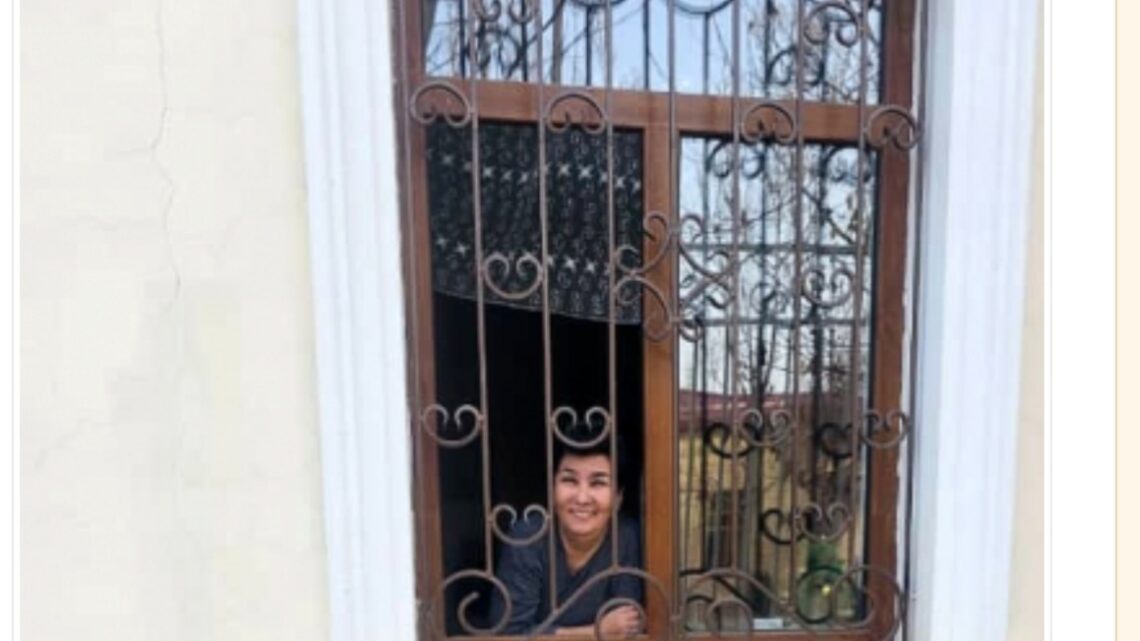A housing rights activist has been in a mental institution for a year
15.01.2024Shokhida Salomova, who accused the Uzbek President’s family of corruption, has been held in a mental institution for a year now
Ms Shokhida Salomova (born 1962), the author and administrator of the Telegram channel “Patanatomy of the Land of Uz” and the YouTube channel “Shahina Salomova”, which had more than six thousand followers, has been held for more than a year in Tashkent’s City Clinical Psychiatric Hospital (CCPH), where she was placed shortly after her arrest late last year. Unlike regular prisoners, there is no time limit on her stay in the psychiatric hospital, meaning that the authorities can keep the blogger there as long as they wish.
What Salomova was talking about
The blogger has often harshly criticized government officials, heads of the local administrations (in particular, the mayor of Tashkent), prosecutors, judges, and President Mirziyoyev himself, along with his family, in her Telegram and YouTube channels. She covered cases of houses demolitions and forced eviction, which have become a national disaster in recent years. Salomova presented her opinions in a logical and legally well-reasoned manner.
In November, Otabek Umarov, the younger son-in-law of President Shavkat Mirziyoyev, was criticized by Shokhida Salomova. According to the blogger, Umarov, who lives in the Mirzo-Ulugbek district of Tashkent, recently bought “twenty” expensive plots of land, each costing an average of five hundred thousand dollars, next door to his house, and now they have demolished everything and are digging a pit. “Apparently, that’s where ‘Mr. Umarov’s’ mansion will be,” Salomova suggested.

Frame from video publication by Shokhida Salomova
In December, she dedicated a story to people who were forcibly evicted from their own homes, and they do not want to give normal compensation. “Mr. President, is it possible to do this? These are our people. Do you like this situation?” – the blogger addressed Mirziyoyev directly. And showed the cellophane shelter where the former property owners slept with their belongings. “Land is sold and then thrown out,” “Come out in support, the picket is not prohibited,” Salomova urged.
In another video, she gave the floor to Tashkent residents whose houses were demolished because the mayor gave the land on which they are located to private developers and the courts decided to evict them all. The victims told how they tried to file an application to the head of the presidential administration, Sardor Umurzakov, but no one came out to them, and the guards said no one accepts applications here. “People are becoming homeless to please someone’s development, someone’s business interests,” the blogger commented on what was happening.
She also explained how “violators” are punished in Uzbekistan – the workers in Fergana, the blogger Olimjon Khaidarov, who were charged with “violating the rules for holding rallies”. “And where are they, these rules that were violated?” asked Salomova. And noted that no one is allowed to hold rallies. “Indeed, we have no laws on rallies, during Mirziyoyev’s six years in power, the parliament has not considered or passed such a law.” “It is your fault that our people are dissatisfied – your electricians, gasmen, your power engineers (for gas or power cut), and there is no need to punish our people endlessly,” she said, addressing the authorities.
On those running the state: “Instead of stopping, they keep plundering, gobbling, robbing and ruining,” “Criminal authorities who have plundered everything that could be plundered; they have not built any economic foundations for our country during the entire term of President Mirziyoyev’s rule. They have been enriching themselves, their families, their close relatives all this time”.
It was around this time that the investigation began to collect statements against her. Apparently, it was these “ideas” that did not please the “top level” and were later recognized as dangerous for the state.
Shortly after her detention, the Telegram channel “Patanatomy of the Land of Uz” was deleted, along with a rich archive of publications. At the same time, no mention was made of any court decision to delete the channel, since there was neither an expert examination nor a relevant court decision.
The story of Shokhida Salomova’s detention
On the evening of December 18, 2022, after her publication accusing President Mirziyoyev and his family members of corruption and nepotism, Salomova had her internet, landline, and electricity cut off, and then she was arersted and sent to the temporary detention center of Tashkent’s Main Department of Internal Affairs. Representatives of four law enforcement agencies – the Ministry of Internal Affairs, the Prosecutor General’s Office, the Ministry of Emergency Situations and the Service of the State Security – arrived to detain her, with authorization to detain and search her. The authorization was issued without notifying her lawyer, apparently in an expedited manner.
They searched her apartment, took away her computer, phone and some data carriers. After that, Salomova was taken to the investigative isolator of the Main Department of Internal Affairs, announcing that a criminal case had been opened against her under the second parts of Articles 139 (slander) and 140 (insult) of the Criminal Code of the Republic of Uzbekistan.
After her detention, Salomova was held for more than 48 hours in violation of the Criminal Procedure Code, in particular Article 242, according to which detention as a preventive measure is applied only in cases of premeditated crimes for which the Criminal Code provides for a penalty of imprisonment for a term of more than three years (and the maximum penalty under the articles imputed to her is up to three years).

Salomova suffers from several chronic diseases, in particular COPD (Chronic obstructive pulmonary disease), bronchial asthma, and diabetes mellitus. Since she was taken from her home without the insulin and glycometer she needed, in the pre-trial detention center Salomova was wary of eating food she did not know, and she went on a hunger strike. The cold and poor conditions in the pre-trial detention center took a toll on her lungs. Fearing for the consequences, two days after the arrest, the investigators placed Salomova forcibly, without the consent of her relatives, in the State Clinical and Psychiatric Hospital, as if to conduct an expert examination, the terms of which are not limited.After her detention, her lawyer Nail Ayupov, who was hired by her family, was not allowed to see her during the “investigation” on the pretext of bureaucratic delays with the accompanying letter to the warrant for Salomova’s arrest and admission to his client. Salomova was not taken to any investigative activities either. For a month, the investigation collected statements from people who claimed that Salomova had insulted them, at least four in total.
Internet users pointed out the absolute illegality of what was happening: if Salomova was guilty, the victim(s) should have written a statement against her themselves, and not at the call of investigator Tadzhiev. And only after the necessary expert examination of whether her posts contained libel and insult, the blogger should have been summoned to come with a lawyer.
On February 8, 2023, the criminal court of the Mirabad district of Tashkent, presided over by Judge Surayohon Khuzhamkulova, declared Shokhida Salomova mentally insane and sent her to indefinite compulsory treatment.
During Salomova’s trial, an assistant prosecutor named Haidarova read out the charge, which stated that the defendant had insulted a number of citizens “with the help of the Internet,” etc., and should be sent for compulsory treatment. That is, there was no question of legally established responsibility for insults in an administrative or criminal order – straight to a mental institution.
The “victims” stated that the defendant had also insulted him, that she was not allowed to engage in public activities, and that she should – again – be sent for compulsory treatment.
Then the medical expert spoke, whose speech was summarized as follows: Shokhida Salomova has outbursts of mental deviations, and she also has ideas in which she believes, which are dangerous for the state.
According to the medical expertise, Salomova was diagnosed with “paranoid personality disorder”. In particular, during the examination, the psychiatrist asked Salomova whether she considered herself guilty. Salomova replied that the question of guilt is asked by investigative or court officials, but not by psychiatrists. In response, the psychiatrist noted in the examination that Salomova lacked self-critical thinking and therefore could not perceive reality adequately.
Salomova’s lawyer appealed against the decision of the Mirabad District Court. However, the appellate panel upheld the lower instance verdict
In a psychiatric hospital
So, since the end of December 2022, Salomova has been held in a psychiatric clinic without the right to walk even in the clinic yard. The only means of communication with the outside world remains the only landline phone in her ward, which is shared by all patients. Salomova’s daughter has been living with her family in London for several years and her sister lives in Samarkand.
For 10 months, Salomova has asked for specialized doctors for her chronic diseases: an endocrinologist, a cardiologist and a pulmonologist. But the clinic refused her request. And only in November she was provided with specialists. Also during the whole year of her stay, after Salomova’s repeated requests, the clinic gave her the necessary diabetes medications, in particular insulin, and that only for three months. After this period, insulin for Salomova is bought by her own family. The lack of proper treatment has resulted in Salomova’s sugar levels being higher than normal for several weeks now.
The clinic is also unable to provide Salomova with adequate nutrition because the clinic has been cut off from funding for food, which is supplied by an outsourcing company. As a result, the provision of food for Salomova also falls on the family’s shoulders. Salomova has written several complaints to the Cabinet of Ministers and the Administration of the President of the Republic of Uzbekistan on this matter.
Regarding psychiatric treatment, Salomova was obliged to take one psychotropic drug “Sedarex” (Risperidone) and one antidepressant “Amitryptiline”. After taking these drugs for three months, she noticed that she began to have memory problems and had difficulty putting words together in sentences. The attending doctor tried to persuade Salomova to take the tranquilizer “Zolomax”, but she refused to take it, as it is contraindicated for people with lung diseases.
Salomova was never given an official report on her diagnosis of paranoid personality disorder, but was only informed verbally. During her entire stay, a repeated psychiatric evaluation was conducted only once – at the end of August, and that was at her request. Although according to the law, such an examination should be carried out at least once every six months. This examination “did not find” any improvement in Salomova’s condition, and she was prolonged compulsory treatment for an indefinite period.
All of the above suggests that the authorities are not going to let Salomova go free. Her indefinite confinement in a psychiatric hospital is causing irreparable damage to her health.
Decision of the Mirabad District Criminal Court of Tashkent
On January 5, 2024, the Mirabad District Criminal Court of Tashkent City under the chairmanship of Judge Sh. Shermatov with participation of Deputy Prosecutor of Mirabad District Sh. Sherkulov, lawyer R. Bakieva, considered the request of the medical commission of the City Clinical Psychiatric Hospital (CCPH) of Tashkent to change the forced measure of medical nature with termination of forced treatment in the department with general observation regime of the CCPH and transfer for compulsory treatment to the National Psychiatric Hospital with Intensive Observation in respect of Salomova Shahida Ergashevna, 24.04.1962, native of Samarkand, citizen of Uzbekistan, unmarried, with higher education, unemployed, with one child, previously unconvicted, living at the address: Tashkent, Yunusabad district, quarter 11, building 8, flat 43.
The court studied the materials, listened to the opinion of the parties, and found:
- By a ruling of the Mirabad District Criminal Court of Tashkent City dated February 8, 2023, Sh. Salomova was subjected to a compulsory measure of medical nature in the form of compulsory treatment in a department with a general observation regime.
- By a ruling of the Mirabad District Criminal Court of Tashkent City dated April 13, 2023, Salomova’s compulsory measure of medical nature in the form of compulsory treatment in a general observation ward was extended.
According to the conclusion #1 dated January 05, 2024, on the same day she was submitted to the commission for review of compulsory medical measures. At the time of examination Salomova is tidy in appearance, contact is available formally, she is verbose, oriented in all spheres correctly. She explained that she refuses to take medications because of their side effects. In the ward her condition is unstable, she repeatedly refused to take medications. Salomova suffers from paranoid personality disorder, she is in a state of decompensation.
Unstable psychiatric condition, expressed in the violation of critical abilities and refusal to take prescribed medications, makes it impossible to keep the patient in the ward with general observation regime. In view of the above, the commission of psychiatrists requests the court to change the compulsory measure of medical nature with termination of Sh. Salomova’s compulsory treatment in the general observation ward of the CCPH and transfer her to the National Psychiatric Hospital with intensive supervision.
The court, having heard the opinion of the parties, studied the materials attached to the request, taking into account the unstable psychiatric condition of Sh. Salomova, expressed in the violation of critical abilities and refusal to take the prescribed drugs, making it impossible to keep the patient in the department with a general regime of observation, taking into account that during the period of treatment the psychiatric condition of Sh. Salomova worsened, considers it appropriate to satisfy the request.
Guided by Articles 570, 580 of the Criminal Procédures Code of the Republic of Uzbekistan, the court DECIDED :
To satisfy the request of the medical commission of the Tashkent City Clinical Psychiatric Hospital.
To replace Sh. Salomova’s compulsory measure of medical nature in the CCPH with a compulsory measure of medical nature in the form of compulsory treatment in the National Psychiatric Hospital with intensive supervision.
Execution of the determination shall be entrusted to the City Clinical Psychiatric Hospital.
Judge Sh. Shermatov”
Translated and resumed by Farida Sharifullina


